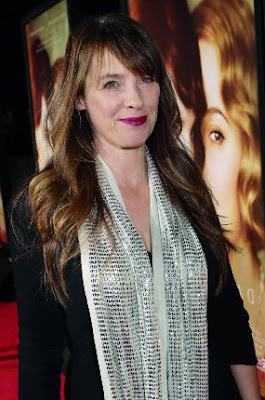Eat your heart out, Hollywood. For almost 17 times the budget of the excellent Norwegian special-effects thriller, THE WAVE, Hollywood managed to give us last year's CGI-crammed blockbuster, San Andreas. Yes, those special effects were good -- if still problematic because of the far-too-high-def quality that the best CGI often provides -- but the story, writing and direction all seemed typical, obvious and, well, second rate. When set against this relatively little (though certainly big-budgeted for any Scandinavian country) film, thanks to its tight plotting, smart dialog and the kind of realistic performances that pull you in and make you care about the protagonists, the silly time-honored coincidences and last-minutes "saves" of San Andreas seem mostly ridiculous.
Director Roar Uthaug (shown at right) knows how to set up his situation for maximum potential: a family man about to leave his job as geologist and protector of a popular tourist town in the Norwegian fjords suddenly grows worried about the seismic activity in the area. Sure enough, some-thing bad is afoot, and it will take every bit of his strength and endurance to save his family, friends and coworkers (below) from a watery grave.
Not everyone does get saved, by the way, and how all this happens -- quickly, sometimes shockingly -- provides surprise, occasional humor, and a larger, more jolting dose of deep feeling than you find in most movies of this popular genre.
The leading players seem drawn from a real family, just as does our hero (Kristoffer Joner, above) and his co-workers, all of whom appear as savvy geologists. The screenplay wastes little time on anything not germane to either the family, the crisis or the post-crisis (and even more disturbing) outcome.
The special effects provide everything that is called for, and while they are used quickly and rather sparingly, when compared to what we get from our home-grown product, they work all too well, providing fright and shock aplenty. And filmmaker Uthaug knows how to ratchet the suspense to keep us on those proverbial tenterhooks. Yet nothing seems to go on too long. (The film lasts but 104 minutes, considerably shorter than most of our versions of the disaster blockbuster.)
From Magnolia Pictures, The Wave opens all across the country this Friday, March 4, and will reach even more cities and theaters in the weeks to come. (Click here to view all playdates, cities and theater scheduled so far.) The movie is everywhere, in fact, except down here in Florida. Maybe the distributor feels it would be just too much for us coastal folk. So I guess Floridians will have to wait for DVD and streaming.


























































